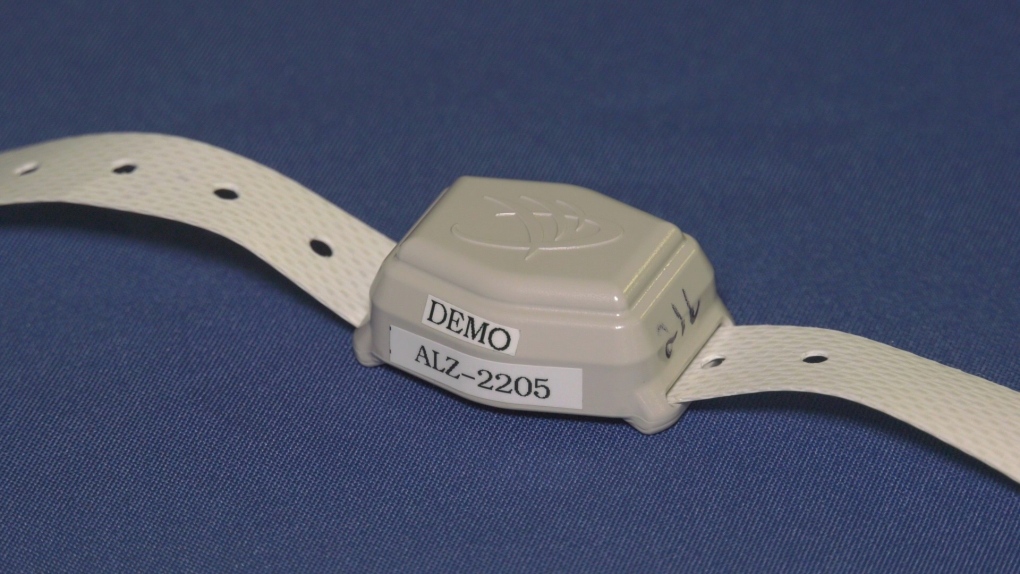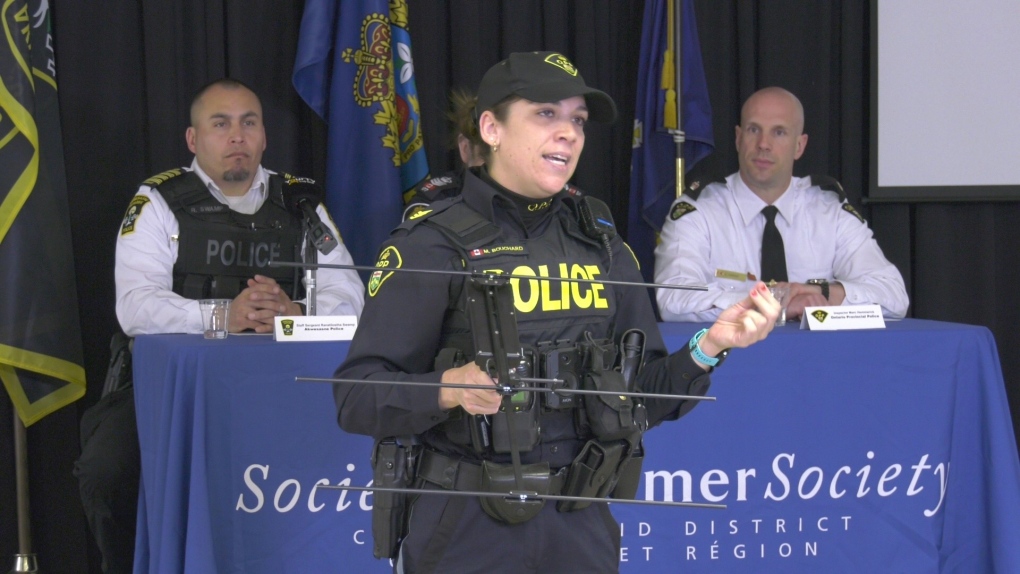
Project Lifesaver to help people living with Alzheimer's launches in eastern Ontario
 Cornwall police staff. Sgt. George Knezevic speaks at the launch for the Project Lifesaver, which helps locate missing people with dementia or Alzheimer's. (Nate Vandermeer/CTV News Ottawa)
Cornwall police staff. Sgt. George Knezevic speaks at the launch for the Project Lifesaver, which helps locate missing people with dementia or Alzheimer's. (Nate Vandermeer/CTV News Ottawa)
A program to help locate missing people living with dementia or Alzheimer's officially launched in eastern Ontario on Wednesday.
The initiative is a collaboration between the Alzheimer's Society of Cornwall & District, Ontario Provincial Police, Cornwall Police and Akwesasne Police.
The program works by using radio frequency to find a missing person living with dementia or Alzheimer's who is wearing a bracelet transmitter.
"We know that people with dementia and Alzheimer's are growing, the population is growing," Cornwall police Staff Sgt. George Knezevic said.
"We recognize that this is an opportunity for us to develop this program, bring it here to Cornwall and district, and provide the training to our police officers so we can, as quickly as we can, bring those loved ones home."
 The radio transmitter bracelet used as part of Project Lifesaver, which helps locate missing people with dementia or Alzheimer's. (Nate Vandermeer/CTV News Ottawa)
The radio transmitter bracelet used as part of Project Lifesaver, which helps locate missing people with dementia or Alzheimer's. (Nate Vandermeer/CTV News Ottawa)
Knezevic, who also sits on the board of the Cornwall & District Alzheimer's Society, said this is another tool for families to use for checking on their loved ones.
"Families will have their own mechanisms for checking with their loved ones who have dementia or Alzheimer's, but again this is just one component," he said.
Project Lifesaver has helped rescue more than 4,000 people across North America. It will be available for residents living in Stormont-Dundas-Glengarry Counties, Prescott-Russell Counties, the city of Cornwall and Akwesasne First Nation.
According to the Society, 60 per cent of people who live with dementia will get lost at some point. For those looking to join the program, participants must:
- Have a confirmed or suspected diagnosis of dementia or related disorder
- Be at high risk of wandering
- Have daily contact with a caregiver or family member
- Be restricted from operating a motor vehicle
- Live in the 5 districts of Cornwall, SD&G, Hawkesbury, Russell and Akwesasne
 Ontario Provincial Police demonstrate Project Lifesaver, which uses radio frequency to find a missing person living with dementia or Alzheimer's who is wearing a bracelet transmitter. (Nate Vandermeer/CTV News Ottawa)
Ontario Provincial Police demonstrate Project Lifesaver, which uses radio frequency to find a missing person living with dementia or Alzheimer's who is wearing a bracelet transmitter. (Nate Vandermeer/CTV News Ottawa)
Project Lifesaver equipment must also be monitored daily by a care partner, and regular visits by an Alzheimer Society worker for equipment maintenance will be included as part of the program.
Knezevic says the group has been working for 18 months to launch the initiative in the region.
"Searches can last hours and hours. This will cut it down in much shorter period of time," he added.
For all inquiries about Project Lifesaver, call the Alzheimer Society of Cornwall & District at (613)932-4914 or toll-free at 1(888) 222-1445.
In-person visits can also be made Monday to Friday between 8:30 a.m. and 4:30 p.m. at 106B Second St. W. in Cornwall.
CTVNews.ca Top Stories

'You're already past due': U.S. House intelligence committee chair implores Canada to increase defence spending
The chair of the United States House intelligence committee says Canada needs to accelerate its defence spending targets, especially with its military in 'desperate' need of investment.
7 suspects, including 13-year-old, charged following 'violent' home invasion north of Toronto
Seven teenage suspects, including a 13-year-old, have been arrested following a targeted and “violent” home invasion in Vaughan on Friday, police say.
Scurvy resurgence highlights issues of food insecurity in Canada's rural and remote areas
A disease often thought to only affect 18th century sailors is reemerging in Canada.
Trudeau calls violence in Montreal 'appalling' as NATO protest continues
Anti-NATO protesters gathered again in Montreal on Saturday to demand Canada withdraw from the alliance, a day after a demonstration organized by different groups resulted in arrests, burned cars and shattered windows.
Ants marching into spotlight as hobby of ant-keeping rise in popularity
They are tiny insects that are often overlooked or stepped on, but ants are marching not only into people’s backyards, but also their homes, as the popularity of ant-keeping rises in Canada.
These vascular risks are strongly associated with severe stroke, researchers say
Many risk factors can lead to a stroke, but the magnitude of risk from some of these conditions or behaviours may have a stronger association with severe stroke compared with mild stroke, according to a new study.
'It's an optimistic space:' Inside Toronto's new drug withdrawal centre
Joshua Orson sits on the edge of a bed in a bright, clean room, thinking about his journey from addict to health-care worker.
Widow of Chinese businessman who was executed for murder can sell her Vancouver house, court rules
A murder in China and a civil lawsuit in B.C. have been preventing the sale of multiple Vancouver homes, but one of them could soon hit the market after a court ruling.
Israel says rabbi who went missing in the UAE was killed
Israel said Sunday that the body of an Israeli-Moldovan rabbi who went missing in the United Arab Emirates has been found after he was killed in what it described as a 'heinous antisemitic terror incident.'

































